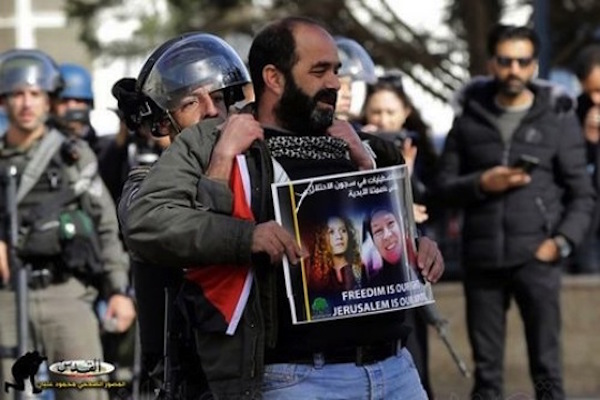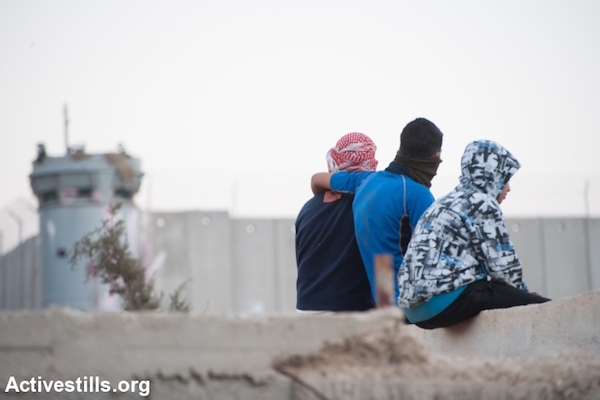The Israeli occupation thinks that my father, non-violent organizer Munther Amirah, is a threat to its apartheid system because he radiates hope to our community.
By Ghaida Amirah

I was born at a time when people believed the Israeli occupation would soon be over. Following the signing of the Oslo agreement, my father was confident there would be no Israeli occupation by the time I entered school. Long years went by. I am 23 years old now and just recently graduated as a lawyer. But my father, Munther Amirah, is now in an Israeli prison.
My father serves as the coordinator of the Popular Struggle Committee and was the former secretary general of the Palestinian Union of Social Workers and Psychologists. Israeli soldiers arrested him over a month ago in Bethlehem for demonstrating against the U.S. decision to recognize Jerusalem as Israel’s capital. Since then, an Israeli military court has been keeping my father in prison, even though they could not prove any of the baseless charges against him.
Obviously, Israel will not say the real reasons for his arrest out loud. They know my father is innocent of what he is accused, but want him and all Palestinians to accept the systematic denial of our rights. Israel continues to slam every Palestinian for resisting and fighting the occupation in any way, shape, or form: whether by using international law, promoting BDS, or simply demonstrating on the streets. In my dad’s case, the Israeli military court is sending a message of intimidation to those who challenge their apartheid regime and come out to the streets — even nonviolently — to demonstrate for freedom and justice.
The military judge was certainly irritated when my father stated that under international law Bethlehem is not part of Israel and therefore he did not need their permission to demonstrate against Trump’s decision. I’m also certain the judge was equally upset when my father said that Israel’s occupation is only encouraging more violence. After long interrogations that deprived my dad of any sleep, those who ordered his imprisonment were certainly frustrated with his high morals even when he was taken to court.
My father is doing what anyone should be doing in a situation of injustice: resisting it. But it is not always easy for us to accept the risks that he takes for his freedom and life. In fact, he was supposed to be in the hospital at the time of his arrest: he had a fever due to a severe infection, in addition to being a hypertensive patient. Though he knew the risks of going to a demonstration, he strongly believed that it was his duty to participate, in spite of his physical condition.
My mother is very strong and she has helped my four siblings and me to remain hopeful. The younger ones, Youmna, 12, and Mohammad, 8, are very anxious to know when they will be able to hug him again. They understand that we live under an authoritarian occupation, but they don’t realize how participating in a demonstration could be a reason for our father’s arrest.

Youmna and Mohammad attend school in the Salesian Convent of Cremisan, located in a beautiful valley where Israel is expanding its settlements and building the annexation wall. Several years ago, a local priest decided to demonstrate against this by organizing an open-air mass every Friday. And so we joined my father to pray for justice and peace. Experiences like this one made me admire my father even more — for teaching us that everyone has a role to play in our struggle for freedom. This included a Muslim like me joining a Christian prayer, and we have witnessed this, too, in the demonstrations for Al Aqsa Mosque in Jerusalem last July, when Christians joined Muslim prayers.
While the United States is threatening our people with sanctions, and while Europe continues to pamper Israel, the occupier remains confident that it won’t pay any price. Regardless, the Israeli occupation will not be able to corrupt our dignity or break our will.
After a lifetime under Israel’s occupation, this experience will only make my father stronger. The Israeli occupation thinks that my father, a non-violent activist, is a threat to its apartheid system because he radiates hope to our community. It is out of his teachings that I aspire to become a human rights lawyer — and we will continue to organize our communities, demonstrate, and campaign until Palestine is free.
When I was born everyone was getting ready to have an independent state. I don’t know if freedom is coming soon or not. But I have learned from my father that we hold the right to pursue our rights. Consider this a testimony of a proud daughter whose father is in an Israeli jail for the “crime” of believing that Palestine will be free.
The author is a young Palestinian from Aida Refugee Camp in Bethlehem. She recently graduated with a law degree from Al Ahliyya Palestine University. She would like to specialize in International Humanitarian Law.
